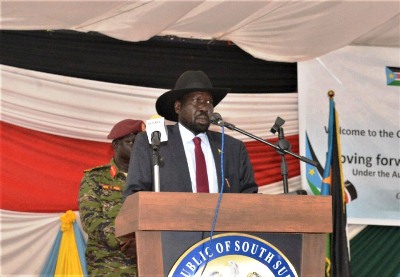S. Sudan’s Kiir reiterates need to form unity government
November 5, 2019 (JUBA) – South Sudan’s President Salva Kiir has reiterated his position on the need to form the transitional national unity government on November 12, despite the country’s armed opposition faction’s (SPLM-IO) insistence on an extension of the process.

“As you all know, I have consistently reiterated my position to form the unity government as agreed upon on November 12, 2019. We will go ahead and form the government of national unity,” he said.
Last month, the armed opposition leader told a delegation from the United Nations Security Council in Juba that he was unlikely to be part of the unity government, citing failure to resolve outstanding issues like the creation of unified forces, consensus on the number of states and boundaries as well as the establishment of protection forces.
The pressure is already mounting on the country’s leaders to ensure the national unity government is formed as agreed upon in May.
The United States has expressed frustration with both Kiir and Machar, threatening sanctions if they fail to form a government on time.
On Monday, a US-based think tank warned that South Sudan could slide back into war if a coalition government is formed on November 12 without reaching compromise on some of its outstanding issues.
The International Crisis Group (ICG), in a briefing entitled, “Déjà Vu: Preventing Another Collapse in South Sudan”, said regional heads of states, the African Union and western diplomats should urge Kiir not to form a government minus consensus.
“They should step in to help mediate a way forward, given political paralysis among South Sudan’s neighbours, initially envisioned as the deal’s key guarantors,” argued the group.
South Sudan descended into civil war in mid-December 2013 when President Kiir accused his former deputy Machar of plotting a coup, allegations he dismissed.
In September last year, the country’s rival factions signed a revitalized peace deal to end the civil war that killed tens of thousands of people and displaced millions.
According to the 2018 peace deal, a unity government was supposed to be formed in May, but due to unresolved issues, the parties agreed to a six-month extension, settling on November 12.
At least 382,900 people died as a result of the conflict in the world’s youngest nation, a report published by the London School of Hygiene and Tropical Medicine last year revealed.
(ST)
